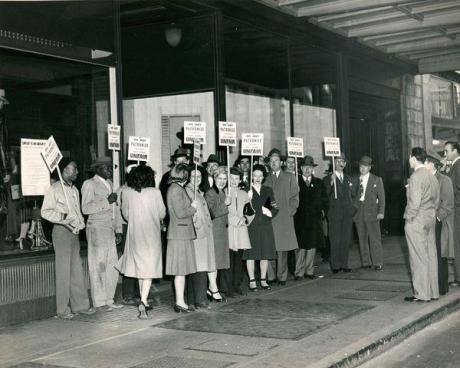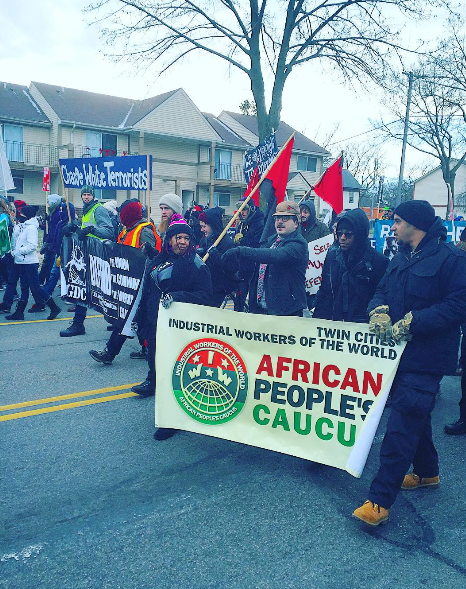JahFocus CS
Get It How You Get It
To escape Trump's America, we need to bring the militant labor tactics of 1946 back to the future
@Type Username Here @Swavy Karl Marx @Madvillain @BaggerofTea

The last general strike in the US was in Oakland in 1946. That year there were 6 city-wide general strikes, plus nationwide strikes in steel, coal, and rail transport. More than 5 million workers struck in the biggest strike wave of US history. So what happened? Why haven't we ever gone out like that again? ... When we allowed ourselves to lose our most important weapons 70 years ago, we took the first step towards Trump's America. We're stuck in the wrong timeline - if we want to get out, we have to bring the militant labor tactics of 1946 back to the future!
Oakland General Strike. Dec 3, 1946.
Back to the Future, Part 1:
The last general strike in the US was in Oakland in 1946. That year there were 6 city-wide general strikes, plus nationwide strikes in steel, coal, and rail transport. More than 5 million workers struck in the biggest strike wave of US history. So what happened? Why haven't we ever gone out like that again? Congress amended US labor law in 1947, adding massive penalties for the very tactics that had allowed strikes to spread and be successful - and the business unions accepted the new laws. In fact, they even went beyond them by voluntarily adding "no-strike clauses" to every union contract for the last 70 years, and agreeing that when they do strike in between contracts it will only be for their own wages and working conditions, not to support anybody else or to apply pressure about things happening in the broader society. When we allowed ourselves to lose our most important weapons 70 years ago, we took the first step towards Trump's America. We're stuck in the wrong timeline - if we want to get out, we have to bring the militant labor tactics of 1946 back to the future!
The retail workers who began the general strike. Oakland, 1946.
Back to the Future, Part 2:
The Oakland General Strike began early in the morning of December 3, 1946, when police were trying to break up a picket line of mostly female department store clerks who had been on strike since October 21 ("Back to the Future Day"). A streetcar driver saw it happening and stopped his car. This stopped all the cars behind him. All of the passengers who were no longer going to work began immediately picketing at other businesses in Oakland, calling out those workers, and shutting down the businesses. The strike spread from there. Some important points:
- The heroes of this story are the department store clerks who maintained an effective picket for 6 weeks, shutting down the operations of the business, refusing limitations on their ability to picket, and defending their picket when the cops were trying to break it. We need to re-learn how to organize "hard" pickets which actually disrupt commerce, and how to defend those pickets from our enemies. We also need to reject all of the limitations that courts, and the unions, will tell us we have to impose on our pickets.
- The streetcar driver who stopped his car when he saw the cops breaking the picket deserves an honorable mention, like Peter Norman ("the white dude" at the Mexico City Olympics). He knew which side he was on, and he didn't just keep moving. He saw fellow workers under attack and he used his power as a worker to support the right side - despite the fact that the retail workers strike had no immediate tie to his own wages and working conditions. He didn't ask his union if it was OK. He didn't wait to go back to his union meeting and ask them to pass a resolution supporting the retail workers. Basically, it doesn't even matter whether he was a union member. It doesn't even matter if he abstractly thought that women should be quitting their jobs now that World War 2 was over, or if he abstractly supported Jim Crow - he supported fellow workers against the cops. Since 1947, "secondary strikes" like that have been illegal, and his union could have been attacked by the court - but the union probably would have been training him all along that he can only strike in between contracts, and definitely not for anyone else's cause. We need to reject any limitation on our ability to strike in support of fellow workers, or to strike about things beyond our own specific workplaces.
- The passengers on his streetcar and the ones behind it also deserve credit for immediately forming mass pickets, reinforcing the retail workers' picket and also spreading throughout the city and pulling other workers out on strike. They didn't come up with this all in the moment, they learned how to do this over years of tough strikes, including the 1934 general strike in San Francisco that also shut down Oakland. Mass pickets have also been illegal since 1947, and we've lost those traditions. We urgently need to relearn them.
- The unions didn't call the Oakland General Strike - but they sure as hell called it off, and left the retail workers alone in the cold. The general strikes that have happened in the US have almost never been called ahead of time by union. They've almost always happened by workers semi-spontaneously going on strike in solidarity with other workers, supporting the demands of the first group and adding their own. (I say "semi"-spontaneously because the working class had years of practice and preparation leading into each strike - something that's been forcibly removed from our culture over the past 70 years.) Yet by the third day of the Oakland General Strike, the local union leadership was already declaring that the strike was over and everyone except the retail workers should go back to work. As the streetcar drivers were told by their union president, "The International Brotherhood of Teamsters is bitterly opposed to any general strike for any cause. I am therefore ordering you and all those associated with you who are members of our International Union to return to work as soon as possible … No general strike has ever yet brought success to the labor movement." Once the retail workers were left to keep striking alone, it was only a matter of time before they were beaten and had to give up. If we're serious about reviving strikes, we need to prepare people as much as we can for how quickly the union leadership and the Democratic Party will do everything they can to prevent strikes from the start, and to get workers back to work..
@Type Username Here @Swavy Karl Marx @Madvillain @BaggerofTea

 ..Good luck with that strike..theyll just get immigrant laborers to scab.
..Good luck with that strike..theyll just get immigrant laborers to scab. oh wait
oh wait